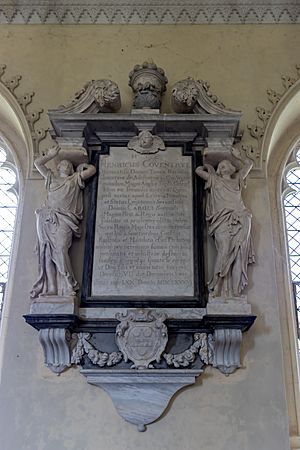Henry Coventry facts for kids

Henry Coventry (born 1619, died 1686) was an important English politician. He was known as "The Honourable" from 1628. He served as a Secretary of State for many years. This job meant he helped the King manage the country's affairs.
He was in charge of the Northern Department from 1672 to 1674. Then he moved to the Southern Department from 1674 to 1680.
Contents
Early Life and Education
Henry Coventry was the third son of Thomas Coventry, 1st Baron Coventry. His mother was Elizabeth Aldersley. He had several famous relatives. These included his brother Sir William Coventry. He was also uncle to the Marquess of Halifax.
Henry started studying at Queen's College, Oxford in 1632. He was 14 years old then. The next year, he finished his first degree. Soon after, he became a Fellow at All Souls College, Oxford. He stayed there until 1648. He earned degrees in both arts and law.
Around 1640, he got permission to travel. He stayed abroad until just before the King returned to England. This meant he was not in England during the English Civil Wars.
A Career in Public Service
By 1654, Henry Coventry was a captain in the Dutch army. But he was also secretly in touch with King Charles II. The King was living in exile at the time. Henry worked as a royal agent in Germany and Denmark. He helped the King from afar.
He returned to England in 1660. He carried important letters for leaders like Sir Anthony Ashley-Cooper. Sir Anthony was married to Henry's sister. Henry also had the support of Edward Hyde, 1st Earl of Clarendon. He remained a loyal friend to Clarendon.
In 1661, Henry became a Member of Parliament (MP). He represented the area of Droitwich. He continued to serve the King. From 1662 to 1672, he was a Groom of the Bedchamber. This was a personal attendant to the King.
Diplomatic Missions
In 1664, Henry was sent as an ambassador to Sweden. He stayed there for two years. People noted he became used to the "northern ways of entertainment."
In 1667, he helped negotiate the Treaty of Breda. This treaty ended a war with the Dutch. He worked with Lord Holles on this important task.
Loyalty to Friends
During the treaty talks, Henry wrote a kind letter. It was to his friend Lord Clarendon. Clarendon's wife had just passed away. Henry also stood up for Clarendon when he was in trouble. Unlike his brother, William, Henry spoke strongly against Clarendon's removal from power.
The King was unhappy with Henry's support for Clarendon. But Henry bravely told the King he needed to speak his mind in Parliament. To the King's credit, he still gave Henry important jobs later on.
Henry continued to show loyalty to Clarendon even when Clarendon was in exile. He helped arrange Clarendon's private funeral in Westminster Abbey after he died.
Becoming Secretary of State
In 1671, Henry went on another mission to Sweden. In 1672, he became Secretary of State for the Northern Department. This was a very high position. In 1674, he moved to the Southern Department.
He held this important job until 1680. He had to retire because of his health. He was a skilled leader. He even built a good intelligence network. He knew about many small issues across the country.
The Popish Plot
During the time of the Popish Plot, Henry remained calm. This was a period of great fear in England. People believed there was a Catholic plot against the King. Henry was worried about the public panic.
Like King Charles II, Henry was doubtful about the plot at first. He was especially careful about William Bedloe, a famous informer. He later believed some kind of plot existed. But he still thought much of the evidence was suspicious.
During the Exclusion Crisis, Henry warned about civil war. This crisis was about preventing the Duke of York from becoming King. Henry believed trying to stop him could lead to conflict.
Henry Coventry's Reputation
People thought Henry Coventry was a clever and honest man. He was known for giving good advice. Even when the King made bad choices, Henry would defend them in public. This showed his loyalty.
He had a very good reputation for being honest. After working in public office for nearly 20 years, he was not super rich. This showed he didn't use his position to gain a lot of money. He even felt a bit poor after losing his official salary.
Henry once wrote about promises: "Promises are like marriages; what we tie with our tongues we cannot untie with our teeth." This meant he took his promises seriously. Lord Clarendon, his friend, thought Henry was much wiser than his brother, William.
 | George Robert Carruthers |
 | Patricia Bath |
 | Jan Ernst Matzeliger |
 | Alexander Miles |

